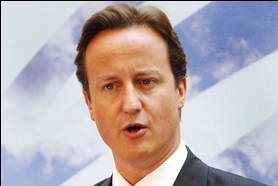Prime Minister 'should show his support for Government-as-a-Platform'
How GaaP could transform public sector with high-level buy-in

Prime Minister David Cameron should voice his support for Government-as-a-Platform (GaaP), which needs more buy-in from senior government figures to transform the public sector, it is claimed.
GaaP is the Government Digital Service's (GDS) attempt to replace expensive legacy IT contracts with user-friendly platforms that can be adopted at little cost across the public sector.
However, the concept requires more support from key Whitehall mandarins and politicians, according to Mark Thompson, University of Cambridge's senior lecturer in information systems.
Speaking at an event hosted by trade body techUK this week, he said: "GDS is doing a fantastic job, but where's [chief executive of the civil service] John Manzoni in this? Where's the Prime Minister, frankly?
"What this is talking about is transitioning to a digital business model for the UK public service economy.
"It's going to be country-changing and we're not getting anything like the level of interest [from senior government figures]."
GaaP will see public bodies' individual, customised IT systems replaced by shared, standardised platforms in a wide transformation of public sector IT.
Sign up today and you will receive a free copy of our Future Focus 2025 report - the leading guidance on AI, cybersecurity and other IT challenges as per 700+ senior executives
But, as it stands now, Thompson claimed that public sector IT leaders will be "dragged kicking and screaming into the 21st century" by the GDS as it tries to get people on board with its digital agenda.
GDS is responsible for several digital projects in government, including shifting more than 300 public body websites to a central platform, Gov.uk.
Other examples of GaaP platformss include the identity assurance platform Gov.uk Verify, and the team is about to create three new ones addressing payments, messaging and bookings.
A commercial model'
Thompson sees GaaP not simply as a way to revolutionise government technology, but government as a whole.
"A platform with no ecosystem is like one hand clapping," he said. "It doesn't make any sense to me, it's just a piece of tech."
Instead, GaaP requires a wholesale rethink of government: the UK could avoid many frontline cuts if it commits to reorganising how the public sector runs as a model, Thompson claimed, hence his call for high-level support for the concept.
Richard Sargeant, GDS's director of performance and delivery, agreed that GaaP is only in part about technology.
He tried to position GaaP in the context of other society-changing innovations created by governments past, claiming these too have been platforms for cultural and economic life.
"The platforms that [government] has provided have often been in the form of common infrastructure; the roads, the energy networks, the law," he said. "This really is more similar in some ways than the iOS or Android comparisons."
Thompson added that consequently, GaaP will have far-reaching consequences. including a shake-up of public sector bodies.
"Ultimately for me GaaP is a commercial model," he said. "The challenge... is what the hell that means for the wider ecosystem of suppliers, what that means for changed roles right up and down the public sector."
Government can't do it on its own
As much as Cameron, Manzoni and other Whitehall bigwigs need to consider GaaP's potential for reforming the way the public sector runs, the GDS stressed that government can't create GaaP by itself.
Sargeant argued that the concept requires third-party expertise and collaboration between the public and private sectors.
He said: "This is not something that government alone can do, but something that will require a constructive engagement with the private sector, the third sector as well as all of the agencies and government departments involved in service delivery.
"GaaP will also involve enormously a selection of suppliers and advice and wisdom from all quarters, including people like Mark and other thinkers across the world."
This commitment from the GDS follows Gov.uk Verify signing up Barclays, GB Group, Morpho, PayPal and Royal Mail as identity assurance suppliers to join the four already part of its programme.
But it contrasts with a recent blog post in which Alex Holmes, the deputy director of the GDS, recommended departments develop services in-house, rather than using external suppliers under the tower IT model.
TechUK said at the time that this had caused its members "some alarm".
But the trade body's director of technology for government, Gordon Morrison, said he welcomed GDS's desire to engage with the private sector over GaaP, saying it was an exciting initiative.
"GaaP is [an] opportunity for the tech industry," he said. "GaaP will play a big role in opening up the public sector to innovation and has the potential to attract really innovative suppliers to government."
Whitehall's former Cloudstore lead for cloud procurement framework G-Cloud, Mark Craddock, told IT Pro on Twitter that any tenders for private sector involvement should be open and transparent.
He pointed to G-Cloud 7 the forthcoming update to the programme as a place to publish GaaP services.
And subsequent to the event, the Cabinet Office revealed plans to trial a new transparency clause in central government department contracts.
It calls for the proactive release of contract details, calling for an approach to disclose information regarding any deal between government and a supplier - but will likely exclude monetary details.
Cabinet Office minister Francis Maude said in a statement: "Transparency is an idea whose time has come. A transparency clause ... will ensure that public authorities can make the necessary information on outsourced public services available to the taxpayer."
-
 Trump's AI executive order could leave US in a 'regulatory vacuum'
Trump's AI executive order could leave US in a 'regulatory vacuum'News Citing a "patchwork of 50 different regulatory regimes" and "ideological bias", President Trump wants rules to be set at a federal level
-
 TPUs: Google's home advantage
TPUs: Google's home advantageITPro Podcast How does TPU v7 stack up against Nvidia's latest chips – and can Google scale AI using only its own supply?
-
 UK government to fund regional tech programs up to £20m
UK government to fund regional tech programs up to £20mnews Local and regional partnerships invited to bid for support for established or developing projects
-
 ‘A major step forward’: Keir Starmer’s £187 million tech skills drive welcomed by UK industry
‘A major step forward’: Keir Starmer’s £187 million tech skills drive welcomed by UK industryNews The ‘TechFirst’ program aims to shore up the UK’s digital skills to meet future AI needs
-
 Government’s ‘Humphrey’ AI tool helps local authorities cut costs
Government’s ‘Humphrey’ AI tool helps local authorities cut costsNews The Minute tool, part of the Humphrey AI assistant, is being trialled at 25 councils
-
 The UK government hopes AI will supercharge public sector digital transformation – IT leaders aren’t so sure
The UK government hopes AI will supercharge public sector digital transformation – IT leaders aren’t so sureNews Research from SolarWinds shows public sector transformation is progressing at a snail's pace despite IT leaders pushing for rapid improvements.
-
 Starmer bets big on AI to unlock public sector savings
Starmer bets big on AI to unlock public sector savingsNews AI adoption could be a major boon for the UK and save taxpayers billions, according to prime minister Keir Starmer.
-
 UK government targets ‘startup’ mindset in AI funding overhaul
UK government targets ‘startup’ mindset in AI funding overhaulNews Public sector AI funding will be overhauled in the UK in a bid to simplify processes and push more projects into development.
-
 UK government signs up Anthropic to improve public services
UK government signs up Anthropic to improve public servicesNews The UK government has signed a memorandum of understanding with Anthropic to explore how the company's Claude AI assistant could be used to improve access to public services.
-
 The UK’s AI ambitions face one major hurdle – finding enough home-grown talent
The UK’s AI ambitions face one major hurdle – finding enough home-grown talentNews Research shows UK enterprises are struggling to fill AI roles, raising concerns over the country's ability to meet expectations in the global AI race.